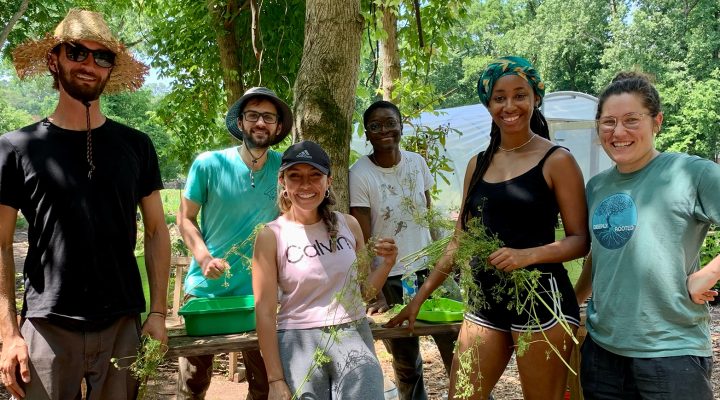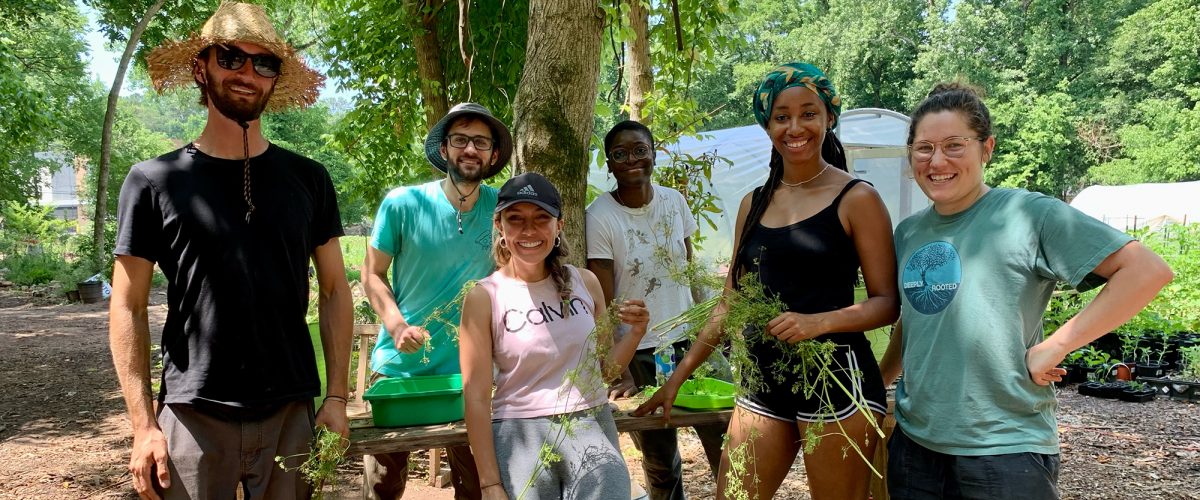Two years out of seminary and a year into the pandemic, I walked away from my full-time nonprofit position and onto a farm. Far from walking away from ministry, I found farming to be a ministry. One that embodies unique opportunities to foster connection and agency that can be vital to the modern congregational context.
In my experience, farming on a small lot in the middle of Atlanta was more than just growing food. I fell in love with farming as a form of incarnational ministry — I could tangibly use my hands to grow food and create an accessible green space for my neighbors.

Heather Franklin
At the time, I was battling increasing feelings of powerlessness and disconnection. I chose to leave the ministry position that checked every box on my “list.” I kept asking myself questions like “What is God calling me to do?” and “What were these years of ministry training for?”
We were one year into the COVID pandemic and the magnification of social upheaval around systematic racism, a divisive election and growing climate crisis felt like pressing and abstract issues that largely were out of my control.
When the world increasingly made me feel powerless, I could do something concrete with dirt under my nails and easy conversation with the person next to me. Working with the earth is inherently grounding. Peace and community are fostered as a sacred side effect.
More importantly, the tradition of farming sits as a unique intersection of issues affecting my life, our congregations and ultimately the community at large: food access, stewardship, environmental justice, creation care, community green space, racial reconciliation, climate change, worker’s rights, spirituality and community building. If any of these ring a bell for you and your community, farming might be a way to minister to your congregation and your neighbors.
Farming is an opportunity to build community with your members, positively impact your neighbors and engage with creation. Food and its production is an easy connection point across demographics (age, race, culture, economic background, education). It often aligns with well-established ministry efforts of food access.
“Farming fosters hands-on opportunities for fellowship while producing a tangible good.”
Farming fosters hands-on opportunities for fellowship while producing a tangible good — food. Incorporating farming encourages better stewardship of church property and can be a pathway to engaging in creation care theology and practices.
For me, the simple grounding and tangible nature of farming provided the connection and agency I needed. Two years on an urban farm showed me I wasn’t the only one for whom this was true.
Here are five ways your church can start incorporating farming as a ministry now:
Try a garden. Let’s do the obvious first. You can start growing regionally specific fruits, produce and herbs right on your church property. This works on a wide variety of spaces like container gardens all the way to several rows. Get your members in the dirt and enjoy the fruits of your labor at Wednesday night supper or donate excess produce to your local food pantry.
Add edible landscaping. Your landscaping and property can go beyond decoration and shade. Make it life giving. Transition the landscaping space on your property to plants that produce fruits, herbs or medicinals. Incorporate a diversity of native species to encourage and establish local flora and fauna. This landscaping can benefit your congregation, community and wildlife while still making your property beautiful.
Support local farmers. Invest in the farmers and organizations in your area who are already doing the work. Guess what, there are probably already folks doing some cool stuff. Ask around or connect with your local farmers’ markets and city government who may be funding farms or bringing food access to underserved neighborhoods. Choose to invest financially or provide your hands for a volunteer day.
Start a farm. Feed your neighbors, create jobs and engage your congregation by starting a farm. While this effort takes planning and resources, you will see firsthand the ways God uses creation to show God’s people love and care.
Lead conversations around creation care. Light a spark about environmental stewardship and farming by leading a series on creation care. In a world where our congregations are behind a screen, a series reflecting on God’s earth is grounding, meditative and can get conversations flowing on how to be better stewards of the earth God has given us.
Heather Franklin earned a master of divinity degree. from Mercer University’s McAfee School of Theology. Her roles in outreach, development and community engagement have supported missions addressing accessible green space, community building, food access, substance abuse, homelessness and homelessness prevention, and health care access.


